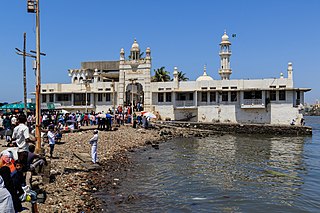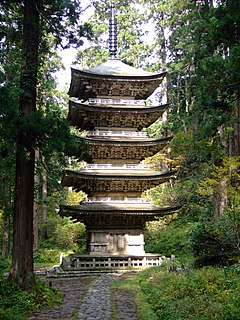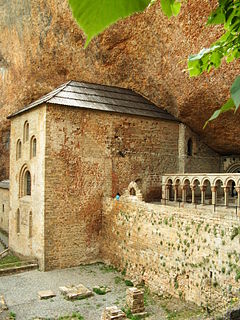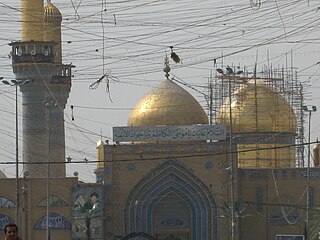
A pilgrimage is a journey, often into an unknown or foreign place, where a person goes in search of new or expanded meaning about their self, others, nature, or a higher good, through the experience. It can lead to a personal transformation, after which the pilgrim returns to their daily life.

A shrine is a sacred or holy space dedicated to a specific deity, ancestor, hero, martyr, saint, daemon, or similar figure of respect, wherein they are venerated or worshipped. Shrines often contain idols, relics, or other such objects associated with the figure being venerated. A shrine at which votive offerings are made is called an altar.

The Camino de Santiago, known in English as the Way of St. James, is a network of pilgrims' ways or pilgrimages leading to the shrine of the apostle Saint James the Great in the cathedral of Santiago de Compostela in Galicia in northwestern Spain, where tradition holds that the remains of the saint are buried. As Pope Benedict XVI said, "It is a Way sown with so many demonstrations of fervour, repentance, hospitality, art and culture which speak to us eloquently of the spiritual roots of the Old Continent." Many follow its routes as a form of spiritual path or retreat for their spiritual growth. It is also popular with hiking and cycling enthusiasts and organized tour groups.

The Haji Ali Dargah is a mosque and dargah or the monument of Pir Haji Ali Shah Bukhari located on an islet off the coast of Worli in the southern Mumbai.

A dargah is a shrine built over the grave of a revered religious figure, often a Sufi saint or dervish. Sufis often visit the shrine for ziyarat, a term associated with religious visits and “pilgrimages”. Dargahs are often associated with Sufi eating and meeting rooms and hostels, called khanqah or hospices. They usually include a mosque, meeting rooms, Islamic religious schools (madrassas), residences for a teacher or caretaker, hospitals, and other buildings for community purposes.

The Three Mountains of Dewa refer to the three sacred mountains of Mount Haguro, Mount Gassan and Mount Yudono, which are clustered together in the ancient province of Dewa. Holy to the Japanese Shinto religion and especially the mountain ascetic cult of Shugendo, Dewa Sanzan are a popular pilgrimage site visited by many, including famed haiku poet Matsuo Bashō.
In Islam, ziyara(h) or ziyarat is a form of pilgrimage to sites associated with Muhammad, his family members and descendants, his companions and other venerated figures in Islam such as the prophets, Sufi auliya, and Islamic scholars. Sites of pilgrimage include mosques, maqams, battlefields, mountains, and caves.

Sharafuddeen Bu Ali Shah Qalandar Panipati renowned as Bu Ali Qalandar born in Panipat, Haryana, India was a Qalandar and Sufi saint of the Chishtī Order who lived and taught in India. His shrine or dargah (mausoleum) is at Bu Ali Shah Qalandar Dargah, Panipat which is a place of pilgrimage.
Ghazi Salar Masud or Ghazi Miyan was a semi-legendary Muslim figure from India. By the 12th century, he had become reputed as a warrior, and his tomb (dargah) at Bahraich, Uttar Pradesh, India, had become a place of pilgrimage.

Christianity has a strong tradition of pilgrimages, both to sites relevant to the New Testament narrative and to sites associated with later saints or miracles.

Yātrā, in Indian-origin religions, Hinduism, Buddhism, Jainism and Sikhism, generally means a pilgrimage to holy places such as confluences of sacred rivers, sacred mountains, places associated with Hindu epics such as the Mahabharata and Ramayana, and other sacred pilgrimage sites. Visiting a sacred place is believed by the pilgrim to purify the self and bring one closer to the divine. The journey itself is as important as the destination, and the hardships of travel serve as an act of devotion in themselves.

Erwadi is a village in Ramanathapuram District, Tamil Nadu, a state in South India. It belongs to Kilakarai Taluk and town panchayat. The village is the location of the grave and shrine of Qutbus Sultan Syed Ibrahim Shaheed Badusha, the previous ruler of Medina. Erwadi also belongs to Kadaladi assembly constituency, which is a part of Ramanathapuram. However, after the delimitations in 2009, Erwadi has been joined to the Ramanathapuram assembly constituency. Although a small town, Erwadi is the second largest contributor for the revenue of Ramanthapuram District.

The July 2010 Baghdad attacks were a series of bombings that involved a suicide bomber and other bomb attacks in Baghdad, Iraq, which killed at least 70 people while injuring 400 during a Shia pilgrimage to the mausoleum of Musa al-Kadhim. The bombings targeted those on the annual pilgrimage and took place from 6 to 8 July. The pilgrimage has been attacked in previous years by Sunni extremists and in 2005 was the site of a stampede that killed up to 1,000 people.
Religion and spirituality, a pilgrimage is a long journey or search of great moral significance. Sometimes, it is a journey to a sacred place or shrine of importance to a person's beliefs and faith. Members of every major religion participate in pilgrimages. A person who makes such a journey is called a pilgrim.

Ajmer Sharif Dargah, Ajmer Dargah, Ajmer Sharif or Dargah Sharif is a Sufi tomb (dargah) of the revered Sufi saint, Moinuddin Chishti, located at Ajmer, Rajasthan, India. The shrine has Chishti's grave (Maqbara).

Moula Ali hill is a monadnock or dome-shaped hill located in Moula Ali, Hyderabad, India. It is well known for the Moula Ali dargah and a holy stone, which are both on top of the hill. The area is maximally inhabited by Muslims.

Syed Zainul Abedin is the Dewan of the Ajmer Sharif Dargah founded by Khawaja Moinuddin Chishti, according to the APEX Court of India. He is the successor of Khwaja Gareeb Nawaz, and is also known as Dargah Dewan, successor, Sajjadanashin of the Chishti order of Sufism, Gaddinashin, Pir and Sheikhul Mashaeikh Dewan Syed Zainul Abedin Ali Khan Sahib of the Ajmer Sharif Dargah.

The Kartarpur Corridor is a visa-free border crossing and corridor, connecting the Gurdwara Darbar Sahib in Pakistan to the border with India. The crossing allows devotees from India to visit the gurdwara in Kartarpur, 4.7 kilometres from the India–Pakistan border on the Pakistani side without a visa. However Pakistani Sikhs are unable to use the border crossing, and cannot access Dera Baba Nanak on the Indian side without first obtaining an Indian visa or unless they work there.

In the South Asian subcontinent, mannat is a wish that one desires to come to fruition and the vow one makes to God after his/her wish comes true.















